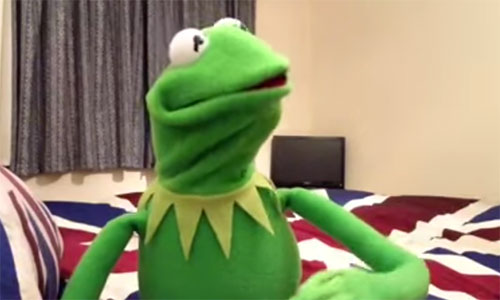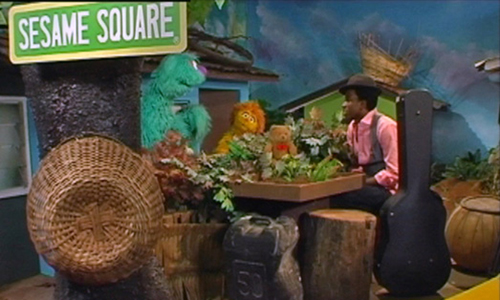The Great Muppet Email
How Jim Henson's life's work became the longest overnight success story in history—and how the Muppets went international.
About those commercials …
While Henson had some early local success with his Muppets in the Washington D.C. area thanks to the hit show Sam and Friends, it took Henson a long time to win over the mainstream with his creations. But when he did, they were fully formed. How? Easy—he used those early commercials to develop his characters. Rowlf, for example, first hawked Purina Dog Chow.
Deep Muppet thoughts
- Are you a man or a Muppet? This 2012 article by Slate’s Dahlia Lithwick argues that there are two kinds of people, and both of them are made of foam and fabric.
- If you’re into mashups, the Myers-Briggs personality tests tend to get combined with Muppets on the regular—something you can see in this Virginian-Pilot article from late last year, or this Pinterest infographic.
- Plenty of academic research exists on the Muppets, much of it worth a gander. If one feels so inclined and finds reading long articles more fun than watching Kermit sing songs about rainbows, there’s always “The Performance of Nonconformity on The Muppet Show—or, How Kermit Made Me Queer,” as well as an entire freaking book that gathers notable critical research on The Muppets. The title? Kermit Culture: Critical Perspectives on Jim Henson’s Muppets.
- A common trope for niche bloggers is tying a complex subject to a pop culture hook. Usually, it’s not a terrible idea, but it’s always possible you can take it too far, such as in this blog post about legal technology, big data … and Beaker.
- Miss Piggy, like Wonder Woman, is often used as an example of a pop-culture feminist icon. The argument’s been made on numerous blogs, but the headline on a 2014 piece from The Daily Beast puts it best: “Miss Piggy Leans In.” In an interview with CBC’s George Stroumboulopoulos from last year, Piggy embraced the comments, but only to a point. “I am an icon to many groups,” she told the host with the overwhelming last name. “But I don’t see myself that way. I just wave my own flag and if people identify with moi, through wish fulfillment of course, I mean, nobody can be me.”
one
The number of Muppet Babies episodes that relayed lessons from Scientology to a Saturday-morning cartoon audience. In a 2000 interview posted on a Geocities-hosted Dungeons and Dragons fan site (really), cartoon writer Jeffrey Scott, a longtime Scientologist, discussed how he used one of L. Ron Hubbard’s “Barriers to Study,” something called “the misunderstood word,” as a plot element to a Mother Goose-themed episode of the animated cartoon. There may have been more, even—Scott wrote 40 episodes of the show, according to IMDB.

The most interesting Muppet subculture
If you dig deeply enough on YouTube, you can find people talking about (and doing) pretty much anything. It can be a weird place. Muppets are part of the package deal here—it’s apparently a thing for people to make replica Muppets to exacting detail and share them with the world at large. “YouTube Replica Muppet Puppeteer” is an interesting hobby, admittedly, though you always get the sense that you’re watching someone’s video resume for the hardest job in the world to nail down.
These guys are impressively talented—even if, based on the view counts, only a few people know about them. Which is why they deserve exposure—the next Henson could be doing a vlog somewhere!
This is a world where folks will inform you that Kermit probably doesn’t have ping-pong balls for eyes. Where the results (for example, Chris Kendall’s handiwork in the screenshot above) are as close to the real thing as you can get. Where Antron Fleece dye methods get discussed in great detail. And new ideas float out of fandom—like the nerdy Muppet-esque vlogger FrogFan76, who talks about how awesome Muppets are in a series of Muppet-style clips of his own.
(By the way, if this sounds fascinating but exhausting, you can always use the Muppet-maker at FAO Schwartz’s Muppet Whatnot Workshop.)

Sesame Street diplomacy
It’s no secret that Sesame Street is one of television’s greatest educational exports. But what might be less understood is the role that the international versions of Big Bird, Cookie Monster, and others play in teaching subtle cultural lessons—or even touching on hot-button political issues in a soft-pedal way. With more than 80 such productions over the years—many of them being co-productions with the U.S. government—there’s room for touching on regional cultural issues. Nigeria’s Sesame Square, shown above, has an HIV-positive character, for example. Other examples:
Northern Ireland
The lingering tensions within Northern Ireland are perhaps a bit calmer than they’ve been in a long time, and Sesame Tree hopes to keep it that way. The narrowly-focused version of the American export focuses on the educational aspects that make the show work, but adds extra emphasis on the idea of accepting one another’s differences—a good message for that part of the world. Among the stars of Sesame Tree is Pollo, Telly’s distant cousin.
The Jewish diaspora
Israel has a version of the show, but less-well-known is its American counterpart, Shalom Sesame. The show, which highlights Jewish culture and is intended for both American and immigrant audiences, has aired sporadically since the mid-’80s, most recently in 2011. You haven’t lived until you’ve heard “Barvazoni,” the Hebrew version of “Rubber Duckie.” (Also of note: Shara’a Simsim, the Palestinian version of the show, has faced funding issues over the years.)
Of course, no conversation about Muppets could be complete without a mention of the greatest Muppet ever, Fozzie Bear. Fozzie, of course, expresses that willingness to stick our necks out that we all try for—and the tingle at the back of our necks we feel when we fail. Fozzie fails early and often—but he never gets angry about that failure. He just keeps trying, and no matter how much he gets mocked, he’s loyal to his friends.
We should all be more like Fozzie. If he were a startup exec, he probably would have founded the next Twitter. (With Gonzo as his marketing guy, obvs.) I credit Fozzie’s family for that can-do attitude. Speaking of families, we’re gonna do a deep dive on pop-culture family trees next Tuesday. It’ll be like Ancestry.com, except with more fanfic action.
Waka Waka!
:format(jpeg)/2018/04/tedium010815--2-.gif)
/2018/04/tedium010815--2-.gif)

/uploads/ernie_crop.jpg)